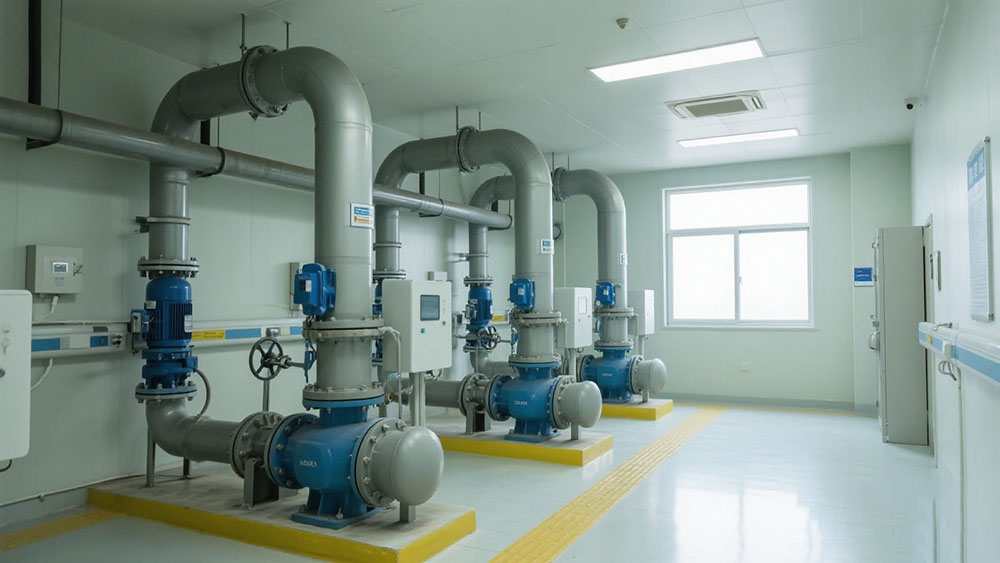+86 13816508465
Pump Solutions
Jun. 21, 2025

When it comes to hospital operations, water management might not immediately come to mind. However, it’s a critical component that affects everything from daily hygiene to life-saving procedures. Hospitals and large healthcare facilities rely on complex water systems that support hot water circulation, vacuum suction, wastewater disposal, and much more. At the center of these systems lies a network of pumps specially designed to ensure operational efficiency, hygienic standards, and patient safety.
This blog will explore integrated pumping solutions for hospitals, focusing on how various pump technologies contribute to different essential systems. By understanding these solutions, healthcare facilities can ensure energy efficiency, reliability, and regulatory compliance.
Ensuring Hot Water Circulation Efficiency
A reliable supply of hot water at a consistent temperature is non-negotiable for hospitals. This is where hot water circulation pumps come into play. These pumps are essential for maintaining a steady flow of hot water across a hospital’s vast network, delivering it instantly to patient rooms, sterilization equipment, and kitchens.
Key Benefits
Optimized Performance: Hot water circulation pumps are typically installed near boilers, solar heaters, or heat exchangers. They keep water circulating throughout the system, ensuring no wait time for hot water.
Healthcare-Friendly Features: Pumps made from anti-scale materials and designed for quiet operation are ideal for healthcare settings, minimizing disruptions and extending equipment lifespan.
Energy Efficiency: Modern hot water pumps often include advanced components, reducing energy consumption and lowering utility costs.
If a hot water circulation pump fails, it can disrupt sterilization processes and patient care. Therefore, investing in a high-quality system is essential.
Pressurized Water Supply Across Facilities
Hospitals span multiple floors, each with diverse water needs. The booster pump for hospitals is critical in maintaining steady water pressure across high-demand environments like patient wards, surgical rooms, dialysis units, and laboratory testing areas.
Features of Booster Pump Systems
Steady Water Pressure: Multistage vertical booster pumps ensure uninterrupted access to water at every floor, even during peak usage periods.
Energy-Saving Regulation: These pumps often feature Variable Frequency Drives (VFD), which adjust water pressure dynamically based on usage, reducing energy consumption.
Tailored Solutions: With modular configurations, pumps can be customized for operations in surgical wards, labs, and specialized areas.
A pressurized water system using multistage pumps for healthcare is vital for the smooth functioning of routines in diverse departments.
Vacuum and Negative Pressure Systems
Vacuum systems are indispensable in hospitals, enabling suction during surgeries and facilitating negative pressure environments to isolate pathogens in infectious disease wards.
Applications of Medical Vacuum Pumps
Surgical Suites and Intensive Care Units: Suction systems powered by medical vacuum pumps remove fluids, enabling clear surgical areas.
Air Isolation Systems: Negative pressure pump systems help control airborne infections in isolation wards, ensuring contaminants do not spread to adjacent areas.
Flexible Technology Options: Hospitals can choose between oil-sealed or dry-running vacuum pumps based on needs and preferences.
Centralized vacuum networks improve operational efficiency while adhering to stringent hygiene standards. This ensures patient care and staff safety are never compromised.
HVAC and Cooling Systems
Temperature control is critical in hospitals, not just for patient comfort but also for equipment reliability. Pumps for cooling systems play a pivotal role in maintaining medical-grade HVAC setups.
Key Applications
Chiller Water Pumps: Used for HVAC cooling to maintain stable temperatures across rooms and medical suites.
Equipment Cooling: MRI scanners, CT machines, and servers require reliable cooling for uninterrupted operations.
Mission-Critical Redundancy: Backup systems ensure no downtime in temperature maintenance, even during pump breakdowns.
Pumps provide consistent water flow to equipment and HVAC systems, maximizing energy efficiency and preventing costly equipment failures.
Sterilizer and Autoclave Water Supply
Hospitals use sterilizers and autoclaves extensively to ensure clean and safe medical tools. The sterilizer water supply pump is vital for delivering purified water to sterilization units.
Precision and Safety Features
Pure Water: Pumps handle deionized (DI) or reverse osmosis (RO) water to meet healthcare-grade requirements for sterilization.
Corrosion Resistance: Stainless steel pumps resist wear and tear caused by pure water systems, extending equipment longevity.
High Precision: These pumps ensure consistent water flow for steam generation and cooling.
Clean water supply for sterilizers enhances infection control, reducing the risk of healthcare-associated infections (HAIs).
Wastewater and Biohazard Fluid Disposal
Healthcare wastewater management demands specialized solutions to handle gray water, biohazardous fluids, and pharmaceutical contaminants properly. Sewage pumps for hospitals tackle this challenge.
Advanced Wastewater Management
Submersible Pumps: Ideal for infection control zones, labs, and isolation wards, these pumps move waste efficiently.
Pre-Treatment Processes: Pump systems integrate with pre-treatment units to neutralize hazardous materials.
Compliance and Safety: Biohazard pumping systems meet strict government disposal policies for infection control.
Hospitals also use medical wastewater treatment pumps to manage environmental hazards responsibly.
Fire Suppression System
Fire safety is paramount in healthcare settings, where evacuations can be complex. Firefighting pump sets, consisting of electric and diesel backup units, ensure robust fire suppression systems.
Critical Safety Features
Pumps designed to comply with standards like NFPA/FM/UL.
Systems integrated with hydrants and sprinklers across facilities.
Reliable backup systems that guarantee performance during emergencies.
These systems protect patients and staff, ensuring safety in critical scenarios.
Reliable Pumps for Healthcare Efficiency
Hospitals are unique in their operational demands. They require pumping solutions that are reliable, quiet, hygienic, and energy-efficient while meeting strict regulations. By investing in high-quality pumps tailored for healthcare, facilities can ensure seamless functionality, cost savings, and above all, patient safety.
Partnering with experts in pump system design guarantees that you'll have a system optimized for your hospital's needs. If you're looking for a hospital building water solution that can tackle every aspect of hospital operations, consult with experienced providers for a turnkey system.
Address
No.17 XeDa Jimei Ind. Park, Xiqing Economic Development Area, Tianjin, China
Telephone
+86 13816508465
QUICK LINKS